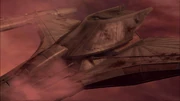Renegade54 (talk | contribs) m (formatting, grammar) |
m (Robot: Automated text replacement (-{{ShipClass +{{class)) |
||
| Line 1: | Line 1: | ||
| − | [[File:IKS Somraw hull collapse.jpg|thumb|[[Klingon]] {{ |
+ | [[File:IKS Somraw hull collapse.jpg|thumb|[[Klingon]] {{class|Raptor}} being crushed by external pressure exceeding 15,000 [[GSC]]]] |
'''Pressure''' is the force per unit area applied on a surface. '''Fluid pressure''' is the pressure at some point within a [[fluid]] environment (liquid or gaseous). If the fluid is not moving quickly, then the term is '''hydrostatic pressure''' for [[liquid]]s, and '''barometric pressure''' for [[gas]]es. If the gas pressure being measured is the [[air]] on a [[planet]] – or in an artificial environment – then the term may be more specifically '''atmospheric pressure'''. |
'''Pressure''' is the force per unit area applied on a surface. '''Fluid pressure''' is the pressure at some point within a [[fluid]] environment (liquid or gaseous). If the fluid is not moving quickly, then the term is '''hydrostatic pressure''' for [[liquid]]s, and '''barometric pressure''' for [[gas]]es. If the gas pressure being measured is the [[air]] on a [[planet]] – or in an artificial environment – then the term may be more specifically '''atmospheric pressure'''. |
||
Revision as of 12:06, 31 July 2013

Klingon Raptor-class being crushed by external pressure exceeding 15,000 GSC
Pressure is the force per unit area applied on a surface. Fluid pressure is the pressure at some point within a fluid environment (liquid or gaseous). If the fluid is not moving quickly, then the term is hydrostatic pressure for liquids, and barometric pressure for gases. If the gas pressure being measured is the air on a planet – or in an artificial environment – then the term may be more specifically atmospheric pressure.
Units of measurement
Comparative list of pressures
- 464 atm, 470 bar, 47 MPa, 6.8×103 psi – Harry Kim counted 47 megapascals on his way to engineering. (VOY: "Twisted")
- 4.93 atm, 5,000 mbar, 500 kPa, 72.5 psi – Capped deuterium well heads are under 5,000 millibars of pressure. (ENT: "Marauders")
- 1.02 atm, 1,033 mbar, 103.3 kPa, 14.9 psi – The internal pressure aboard a Borg cube is two kilopascals above what would be normal on a Federation starship. (Star Trek: First Contact)
- 1 atm, 1,013 mbar, 101.3 kPa, 14.7 psi – The atmospheric pressure of the habitats aboard the Nyrian biosphere vessel, encountered by USS Voyager in 2373, were kept at 1 atm. (VOY: "Displaced")
- 0.89 atm, 900 mbar, 90 kPa, 13.1 psi – The pressure encountered from the leading edge of shock waves encountered by USS Voyager following the explosion of a supernova were over 90 kilopascals – more than 30% higher than predicted. (VOY: "The Q and the Grey")
- 0.790 atm, 800 mbar, 80 kPa, 11.6 psi – The atmosphere at the surface of an unnamed planet which was home to a species of rock creatures was recorded at 800 millibars. (TAS: "Mudd's Passion")
- 0.75 atm, 758 mbar, 75.8 kPa, 11 psi – After the USS Constellation was attacked by the "planet killer", the atmospheric pressure on the ship was measured at eleven pounds per square inch. (TOS: "The Doomsday Machine")
- 0.691 atm, 700 mbar, 70 kPa, 10.2 psi – While traveling to orbit in an mag-lev carriage, Neelix noted that while at an altitude of 800 meters, the carriage was traveling at a velocity thirty of kilometers per hour and the internal atmospheric pressure was at 700 millibars. (VOY: "Rise")
- 0.21 atm, 210 mbar, 21 kPa, 3.0 psi
0.25 atm, 250 mbar, 25 kPa, 3.6 psi – Warp core pressures aboard Starfleet ships were measured in kilopascals. Upon being pulled into the Delta Quadrant, Voyager's warp core pressure was down to 21 kilopascals. Upon unlocking the magnetic interlocks, they were able to increase it to a stable rate of 25 kilopascals. (VOY: "Caretaker")
- 0.113 atm, 114 mbar, 11.4 kPa, 1.7 psi
0.092 atm, 93 mbar, 9.3 kPa, 1.3 psi – The computer warned Tom Paris that his space suit was leaking, informing him that the oxygen level was dropping from 114 millibars to 93 millibars before B'Elanna Torres connected to his suit to share her oxygen. (VOY: "Day of Honor")
- 0.103 atm, 104 mbar, 10.4 kPa, 1.5 psi
0.086 atm, 87 mbar, 8.7 kPa, 1.3 psi
0.070 atm, 71 mbar, 7.1 kPa, 1.0 psi – While Paris and Torres shared their oxygen, the level dropped from 104 millibars, to 87 millibars, and finally to 71 millibars, before they were rescued by Voyager. (VOY: "Day of Honor")
See also
- Blood pressure
- Hydrostatic system
- Neuro-pressure
- Osmotic pressure therapy
- Osteopathic pressure therapy
- Pressure chamber
- Pressure grenade
